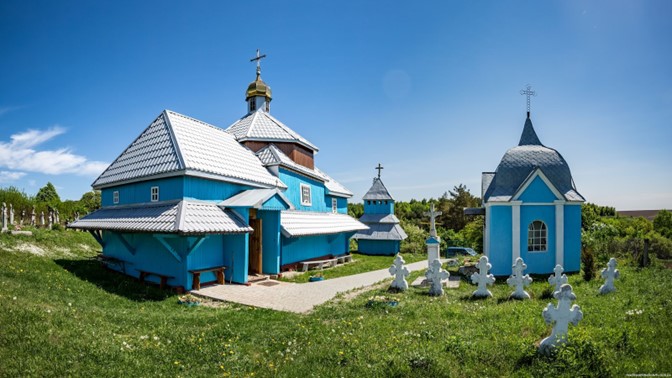Feast Day: October 20th
The year was 1939. It was July, six weeks before Germany invaded Poland and World War II began. A young college student by the name of Karol Wojtyła was one year into his philosophy studies at the Jagellonian University in Krakow. He was a vibrant young man, having joined a theatre group with other students and his precocious ability with languages and love for athletics and the outdoors were already in full bloom. However, during that summer of 1939, with the world watching Germany gearing up for war, the man who would become pope decades later found himself hundreds of kilometers East of Krakow at a compulsory military training camp at Ozomla (nowadays Ukraine, then still part of Poland). He notably refused to fire a weapon, willing to serve his country, but not by violence.
That same summer, just one hundred kilometers south of Karol, a young diocesan priest was doing the simple work of pastoring a couple of parishes in the Archdiocese of Lwów. This would become Lviv, Ukraine, after the war when that country was resurrected, though as part of the Soviet Union, but for now this also was part of Poland. He was the son of a Byzantine Rite deacon, Vasyl, and mother, Maria, having grown up in the further-south city of Mykolaiv with his five siblings. He had entered seminary in 1931 and had been ordained a priest on June 7th 1936. Fr. Oleksa Zaryckyi was first assigned as an administrator of the small parishes in Stynawa Wyżna (St. Nicholas the Wonderworker) and Nizhna Stynava (St. Michael the Archangel) though by 1939 he had been moved to the Parish of the Assumption of the Blessed Virgin Mary in Zolochiv. I include a picture of this Church since it is simply picturesque! It was built in 1846 and still stands there today!

His early parishes loved him. He was gentle, humble, pious, a good and holy priest and though the War was horrible, he was able to continue the simple work of being a pastor. That all changed when the war ended with the Soviet Union in control of the newly formed country of Ukraine. Fr. Oleksa refused to be joined to the Russian Orthodox Church – the national church allowed by the USSR – maintaining his allegiance to the Ukrainian Greek Catholic Church, and for this was arrested and sent first to prison in Złoczew, the released before being rearrested and imprisoned in Lwiw. The MGB (successor of the NKVD) sentenced him to a decade of forced labor in the Gulag, first in Irkutsk (near Mongolia), then Mordovia (East of Moscow), then Omsk (in Siberia). He was released in 1954 and exiled to Kazakhstan.
The records from his arrest and forced labor simply list years and cities, giving us very little sense of his life during that decade. We just know that he survived the Gulag, and as a priest there in Kazakhstan, was named the Greek Catholic Apostolic Administrator of Kazakhstan and Siberia, nicknamed the apostle of Siberia, a work he continued until 1963. Just to press pause and recognize that his flock was at least 150,000 faithful and 150 exiled priests, trying to cover an area of land not much smaller than all of North America. He traveled with just his passport, risking arrest everywhere he went, celebrating Mass or the Divine Liturgy – depending on the Rite practiced by whoever he was serving that day – and did so in houses, mines, wherever they could gather people together. He often skipped meals to keep giving people the sacraments. In May of 1962 was arrested in Karaganda, the charge was “vagrancy”, and sentenced to two years in the Dolinka settlement. He worked as a tailor, did what he could as a priest, but his health deteriorated and he perished in the camp “hospital” (quotation marks original in the records I used for this article).
But back to Karol Wojtyła, himself surviving the Nazi and Communist occupation of Poland, then elected Pope, and in 2001 for the second time setting foot on Ukrainian soil. He thus became the first Pope to set foot on Ukrainian soil (Martin I had been exiled to Cherson, on the Crimean peninsula, but after abdicating the papacy for Eugene I), and there he preached at the beatification of 25 Ukrainians, including our friend Fr. Oleksa:
Rebuild the temple of the Lord: this is the mission to which you have been called and to which you have devoted yourselves. My thoughts turn at this time to your communities, once scattered and sorely tried. In heart and in spirit I relive the unspeakable trials of all those who suffered not only physical exile and imprisonment, but public ridicule and violence because they chose not to renounce the faith. Here I wish to mention, among others, Blessed Oleksa Zarytsky, priest and martyr, who died in the gulag of Dolynka.
– Fr. Dominic has never been to Ukraine, or Siberia, but the kind of holiness exemplified by Bl. Oleksa Zarytsky is not only found in the communist gulag, but simply in the choice to love wherever we find ourselves. And, whenever he has operated from love, the same Holy Spirit that sanctified Fr. Oleksa is at work in him too.